David Tickner's Blog, page 25
January 20, 2022
Hoard, Horde
 In short, a hoard is about things; a horde is about people.
In short, a hoard is about things; a horde is about people.Hoard
The noun hoard comes from Old English hord, a word meaning a treasure, valuable stock or store, an accumulation of something for preservation or future use; in particular, any mass of things preserved by being deposited together. The source of the word hoard is Proto-Germanic huzdam (treasure; hidden or inmost place) and Proto-Indo-European (PIE) (s)keu (to cover, to conceal). The verb ‘to hoard’ is from the same sources.
The noun hoarder comes from Old English hordere (a treasurer). The Old English word for a library was bochord; literally, a ‘book hoard’.
Hoarder, one who gathers and keeps a stock of something, is from around 1500. Hoarder used in a negative or disapproving sense; e.g., a morbidly overzealous junk collector, is from 1964.
Hoarding, the act of getting and storing up, is from the 1590s.
Interestingly, the Latin word for a hoard, a treasure, or a storehouse is a thesaurus, from Greek thesauros (treasure, storehouse).
Horde
The word horde, from the 1550s, meaning a tribe of Asiatic nomads living in tents (e.g., the so-called ‘Mongol hordes’ or the ‘Golden Horde’) is from West Turkic ordu (camp, army)1 and from Tatar urda (horde). The word horde came to English via Polish, French, or Spanish. The ‘h’ in the English word horde is said to have been acquired via Polish. The use of the word horde to describe any uncivilized gang is from the 1610s.
1 Ordu is the source of Urdu, which began first as a pidgin language and later became a creole language.
Reference: Online Etymological Dictionary, https://www.etymonline.com/
Published on January 20, 2022 08:02
January 16, 2022
Burke
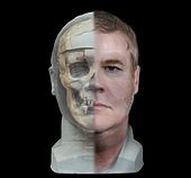 Do you know anyone with the surname Burke or Burk?
Do you know anyone with the surname Burke or Burk?The verb ‘to burke’ means to murder by smothering. The word comes from the name of William Burke who was executed in Edinburgh in 1829 for murdering sixteen people in order to sell their bodies for dissection. Smothering was the preferred method of murder as it left no marks on the victims.
The murders were committed in Edinburgh by Burke and his colleague William Hare over a ten month period in 1828. The corpses were sold to Robert Knox for dissection at his private anatomy school. Such dissection at this time was not against the law; however, the obtaining of bodies for dissection was questionable. The term ‘grave robbing’ comes to mind.
To make a long story short, Hare was acquitted of the murders as he agreed to testify for the prosecution against Burke.
At the end of Burke’s murder trial, as the judge passed the death sentence upon him, he said to Burke, “Your body should be publicly dissected and anatomized. And I trust, that if it is ever customary to preserve skeletons, yours will be preserved, in order that posterity may keep in remembrance your atrocious crimes.”
To quote from Wikipedia: “Burke was hanged on the morning of 28 January 1829 in front of a crowd possibly as large as 25,000 … On 1 February Burke's corpse was publicly dissected by Professor Monro in the anatomy theatre of the Old College, University of Edinburgh. Police had to be called when large numbers of students gathered demanding access to the lecture for which a limited number of tickets had been issued.”
Burke’s skeleton was given to the Edinburgh Medical School where, as of 2021, it still remains.
As a result of both the controversy of the trial and of the need for bodies for dissection at medical schools, a bill was introduced into the British Parliament which gained royal assent to become the Anatomy Act of 1832. This Act authorized dissection of the unclaimed bodies of poor persons who had died in the workhouses of the time. The Act also ended the practice of anatomizing the bodies of criminals as part of their death sentence for murder.
Today, the Merriam-Webster Dictionary lists ‘to burke’ as a verb meaning ‘to suppress quietly or indirectly’. In reference to the Burke trial, Merriam-Webster states that “the word burke became a byword first for death by suffocation or strangulation and eventually for any cover-up… for example, ‘the executives knew that the drug had dangerous side effects, but they burked the findings’”.
Image: Reconstruction of William Burke's image, Wikipedia.
Reference: Online Etymological Dictionary, https://www.etymonline.com/
https://en.wikipedia.org/wiki/Burke_and_Hare_murders
Published on January 16, 2022 20:30
January 15, 2022
Bibliotherapy
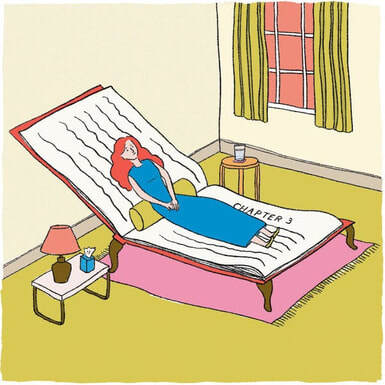
What comes to mind when you hear about this form of therapy? The origins of the word bibliotherapy suggest that a person sits on a chair or couch and reads a book.
Biblio
Biblio is a word-forming element meaning book, from Greek biblion (paper, scroll) and from byblos (Egyptian papyrus). A common suggestion is that biblio is also related to Byblos, the ancient Phoencian port from which Egyptian papyrus was shipped to Greece.
Therapy
The sources of the word therapy are unknown; however, some suggest that PIE dher (to carry, support, hold) is one source for Greek therapon (care, service, attendant, servant) and Greek therapeuein (to attend, do service, take care of; later, to cure, treat medically). The word therapy came to English in 1846. The word therapist is from 1880. The word therapist as practitioner of psychotherapy is from the 1930s.
PIE dher is also the root of Greek thronos (seat, chair, throne).
Seems like the word therapist and his or her supportive chair or couch share the same origins in PIE dher.
Bibliotherapy
The word bibliotherapy first appeared in 1916. However, the practice of giving reading materials to those in mental distress is from the 18th century. In the early 20th century, librarians on staff in some US hospitals were considered therapists.
Today, Merriam-Webster defines bibliotherapy as “the use of reading materials for help in solving personal problems or for psychiatric therapy.” If we an have art therapy or music therapy, why not book therapy?
Image: The New York Times
Reference: Online Etymological Dictionary, https://www.etymonline.com/
Bolger, K. (January/February 2022). Textual healing. The Walrus, 19(1), 77 – 81.
Gottlieb, L. (26 July 2019). Your therapist’s prescription? The right book. The New York Times.
https://www.nytimes.com/2019/07/26/books/review/can-a-book-cure-mental-illness.html
Hillman, J. & Moore, T. (1989). A blue fire: Selected writings. New York: Harper & Row, 73.
Published on January 15, 2022 11:30
January 11, 2022
Tavern
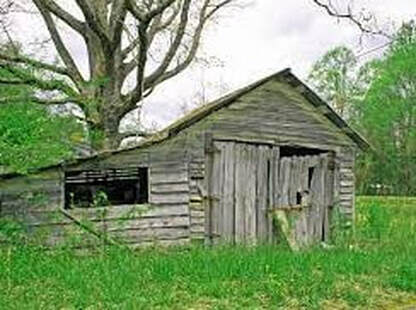 In ancient times, a tavern was a wooden shed.
In ancient times, a tavern was a wooden shed.The word tavern has its origins in Proto-Indo-European (PIE) treb (dwelling), Latin traberna (hut, shed, rude dwelling), and, later, Latin taberna (shop, inn, tavern).
In the late 13th century, the word tavern, meaning a wine shop, came to English from Old French taverne (shed made of boards, booth, stall; tavern, inn).
What about the word pub? The term public house meaning any building open to the public appears in English in the 1570s. A public house, meaning an inn that provides food and is licensed to sell ale, wine, and spirits is from the 1660s. By the 1760s, a public house was synonymous with what had been for centuries called a tavern. Public house was shortened to ‘public’ in the early 1700s and by the 1850s ‘public’ had been further shortened to ‘pub’.
By the way, a publican is not the owner of a pub. During the Roman Empire, a publican was a tax collector.
Reference: Online Etymological Dictionary, https://www.etymonline.com/
Published on January 11, 2022 07:50
January 9, 2022
9 January: Word Nerd Day
 Nerd
NerdHave you ever read or has someone ever read to you the now somewhat controversial book by Dr Seuss, If I Ran the Zoo? You may remember these lines…
“And then, just to show them, I’ll sail to Ka-Troo
And bring back an it-kutch, a preep, and a proo,
A nerkie, a nerd, and a seersucker too!”
The book, published in 1950, is credited with being the first use of the word nerd in print. Around this time, nerd was also an American student slang term said to be related to the slang term nert (stupid or crazy person).
Nert, in turn, is attested from 1903 and may be an alteration of another slang term, ‘nut’. For example, nuts or nutty is often used to describe something crazy. Nut-house (an insane asylum) is from 1929. Nut-case meaning a crazy person is from 1959; the British use the term nutter. Nuts can also mean nonsense.
The first use of the word nuts to mean crazy or not right in the head is from 1846. However, interestingly, nuts meaning ‘to be very fond of’ is from 1785 and meaning ‘any source of pleasure or delight’ is from the 1610s. Perhaps people can seem crazy when they are very fond of someone or something (The word fond is also one of the sources of the word fun; but that’s another story).
In current usage, a nerd is usually a student who is seen as socially inept or slavishly devoted to intellectual or academic pursuits (heaven forbid!).
Word
A word to the wise as we begin: the following item on the origins of the word word describes various words for word. So, in a word, when I write the word word I am not stumbling over my tongue although I may seem a bit wordy. You have my word for it.
So, here we go. The English word word has its origins in PIE wer, were, werdh (to say, to speak). In the beginning, a word was an action rather than a thing.
From PIE wer emerges Proto-Germanic wurdan (the source of Old Saxon and Old Frisian word, Dutch woord, Old High German and German wort, Old Norse oro, and Gothic waurd), and the Old English word word (speech, talk, utterance, statement, news, report, word). The word word came to Old English from these origins with two meanings: first, speech, talk, utterance, report; and, second, a promise (e.g., she kept her word). In oral cultures, before literacy was common, 'to keep your word' was as important to social cohesion as later signed legal documents.
Reference: Online Etymological Dictionary, https://www.etymonline.com/
Published on January 09, 2022 08:32
January 3, 2022
Anthem
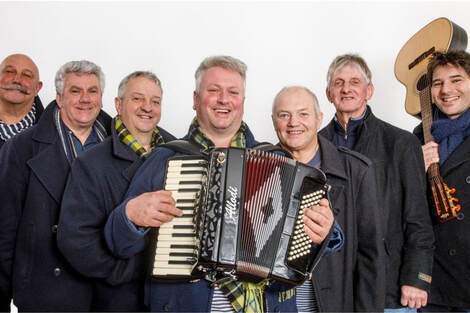 What do ‘O Canada’, ‘Blow the Man Down’, choral anthems for church choirs, African-American gospel music, and the cheers of football cheerleaders all have in common?
What do ‘O Canada’, ‘Blow the Man Down’, choral anthems for church choirs, African-American gospel music, and the cheers of football cheerleaders all have in common?They are all rooted in an ancient musical style known as ‘call and response’ or ‘verse response’ singing in which people sing back and forth together, often following a leader.
In ancient Greece, this ‘verse response’ singing was called antiphona, from anti- (in return) + phone (voice); i.e., antiphona = to return the voices. In Latin, the word antefana was the source of the early 1500s English word antiphon (songs or hymns sung responsively or ‘antiphonally’).
The more general term antiphony is used for singing in any ‘call and response’ style; e.g., ancient Sanskrit kirtans, sea shanties or other work songs, and gospel singing in African and African-American culture. In Sub-Saharan African cultures, call and response singing has been a form of democratic participation, particularly in discussion of civic affairs and religious rituals.
Latin antefana is the source of Old English ontemn or antefn (a composition in prose or verse sung in alternate parts) which, in turn, is the source of the English word anthem.
In the late 14th century, in English, an anthem was a composition, usually from the Bible, set to sacred music. By the 1590s, an anthem was a song of praise or gladness. Early national anthems (e.g., ‘God Save the King / Queen’) were hymns of praise for a country. However, these anthems were not antiphonal.
The original sense of ‘call and response’ or ‘verse response’ has been lost in the modern use of the word anthem. The meaning of anthem has seemingly shifted from ‘singing with’ to ‘listening to’ singing.
Image: https://www.bbc.com/news/uk-england-cornwall-55856179
Reference: Online Etymological Dictionary, https://www.etymonline.com/
https://en.wikipedia.org/wiki/Antiphon
https://en.wikipedia.org/wiki/Call_and_response_(music)
Published on January 03, 2022 10:10
December 28, 2021
Touch, Touching, Touched
 Touch, a word associated with the senses, has a multitude of meanings and uses. The verb ‘to touch’ comes from Latin toccare (to knock, to strike, to strike a bell); touch is something that gets your attention. From Latin comes Old French tochier (to touch, hit, knock, mention, deal with) and, in the late 13th century, the word touch comes to English.
Touch, a word associated with the senses, has a multitude of meanings and uses. The verb ‘to touch’ comes from Latin toccare (to knock, to strike, to strike a bell); touch is something that gets your attention. From Latin comes Old French tochier (to touch, hit, knock, mention, deal with) and, in the late 13th century, the word touch comes to English.The verb touch is used in many ways. Touch, meaning ‘to border on’ or ‘to mention or describe’, is from the 14th century. Touch, meaning to bring into physical contact, to perceive by physical contact, to examine by touch is also from the 14th century. Our senses are the ways in which we touch and are touched by things in our environment.
In addition to the senses, to be ‘touched’ is to be affected or moved mentally or emotionally or spiritually; i.e., the mind or heart has been touched. This use of the verb touch is also from the 14th century. The word ‘touching’, meaning something affecting the emotions, is from around 1600.
The word touch is used in many ways to describe ways in which we are so touched. I’ll now touch on some of these. The noun touch, from around 1300, comes from Old French toche (touch, a touching, a blow, an attack). Touch, meaning a slight attack (of an illness; e.g., ‘a touch of the flu’) is from the 1660s. To be ‘in touch’ or ‘out of touch’ is from 1884. Touch, in the sense of a skill or aptitude in some topic (e.g., art, music), is from 1927. To call someone a ‘soft touch’; i.e., easily manipulated, is from 1940.
Touch and go. Touchdown. Touch a chord. Touch base. The common touch. To lose one’s touch. Magic touch. Don’t be so touchy. Final touch. Touch up. Touch a nerve. Lose touch. A touch of class. I wouldn’t touch it with a ten-foot pole.
Does any of this ring a bell with you?
Reference: Online Etymological Dictionary, https://www.etymonline.com/
Bradfield, E. (2020). Touchy. In The Atlantic magazine
https://www.theatlantic.com/magazine/archive/2020/07/elizabeth-bradfield-touchy/612262/
Published on December 28, 2021 08:13
December 27, 2021
Contemplation
 A hint to understanding the origins and use of the word contemplate is the syllable ‘temp’, which is also the origin of the word temple, and which has its origins in PIE tem (to cut, to create a space that is set apart).
A hint to understanding the origins and use of the word contemplate is the syllable ‘temp’, which is also the origin of the word temple, and which has its origins in PIE tem (to cut, to create a space that is set apart).The sense of PIE tem meaning ‘a place set apart’ is also seen in PIE temp (a cleared space in front of an altar) and in Greek temenos (the sacred area around a temple). From these origins comes Latin templum (a piece of ground consecrated for the taking of auspices, a building for the worship of a god). The Old English word tempel, meaning a building for worship or an edifice dedicated to the service of a deity or any place regarded as occupied by divine presence, leads to the current English word temple.
And so, on to the word contemplation which is derived from Latin templum. When Latin com- (with, together) is added as a prefix to templum, the words contemplari (to set a place apart for observation, to gaze attentively, to observe), contemplationem, and contemplatio (the act of looking at) are formed. Perhaps in this sense, contemplation could be considered as the act of putting oneself in or near a sacred spot in order to gaze upon the divine. 1
Contemplation, meaning a religious musing, comes to English around 1200 from Old French contemplation and Latin contemplationem. Contemplative is from the mid-14th century and the verb ‘to contemplate’ comes from the 1590s.
Could it be said that the act of contemplation is an act of not only putting yourself in a space that is set apart but also putting yourself in a time that is set apart? In addition, could it be said that in a way contemplation is putting yourself in a space and a time in which you experience being set apart from yourself? In a ritual fashion you put yourself in the presence of something other than yourself 2 .
1 Perhaps similar to the concept in Hinduism of 'doing darshan'; i.e., going to a temple to gaze upon the image of the god with the expectation that the god will look back favourably upon the viewer. Interestingly, the national public television broadcaster in India is called Doordarshan.
2 So how are meditation, contemplation, and prayer different? What might the origins of these three words tell us?
Meditation, in its origins, seems to be about thoughtfulness, mindfulness, study, and reflection.
Prayer, in its origins, seems to be about speaking with intention, perhaps on the other side of meditation, in the anticipation of some expected action or outcome.
Contemplation, in its origins, seems to be about being present in a (sacred) space and time that is intentionally set apart from daily activity. Contemplation may include ritual action without necessarily any focus on particular thought or action.
Reference: Online Etymological Dictionary, https://www.etymonline.com/
Published on December 27, 2021 11:31
December 21, 2021
Yule, Yuletide
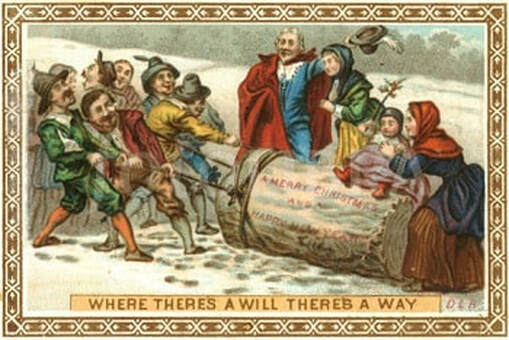 This year, the Yule season or Yuletide, is from 21 December to 1 Jan 2022. Yule is said to be one of the oldest traditional celebrations in Northern Europe.
This year, the Yule season or Yuletide, is from 21 December to 1 Jan 2022. Yule is said to be one of the oldest traditional celebrations in Northern Europe.The word Yule and the meaning and practices of Yule have distant origins which can be traced back to the traditions of ancient Proto-Indo-European (PIE) peoples.
The English word yule is from Old English geol, geola (Christmas Day, Christmastide) and is related to Old Norse jol (a traditional feast taken over by Christianity). Some sources suggest that Old Norse jol was borrowed by Old French to become jolif which later became the word jolly (which originally meant festive); however, other sources beg to disagree.
Another related word, giuli (an Anglian form of Old English) was the Anglo-Saxon name for a two-month midwinter season corresponding to Roman December and January.
Some sources suggest that when the ancient Proto-Indo-Europeans migrated into what is now Scandinavia about 4,000 years ago, they displaced or became integrated with the original aboriginal peoples of the area. One theory suggests that one of the aboriginal words which was taken into the PIE language was Yehwla, the name for the midwinter solstice, a word which, perhaps not coincidentally, is also the Proto-Germanic word thought to be the source of Old Norse jol. Some theories suggest that the word Yehwla comes from the Old Norse god Odin who is also known by the name Jolnir (the yule one).
So, there are many theories for the ancient origins of the word Yule—all interesting in themselves but none that are known for certain.
As Anglo-Saxon English became Christianized, the word Yule came to mean the twelve-day feast of the Nativity which began on 25 December. By the 11th century, the word Christmas replaced Yule except for places in northeast English where the predominant Danish settlers continued to use the word Yule.
The word Yuletide is from the late 15th century. The first reference to a Yule log is from the 17th century. The word Yule in reference to Christmas was revived in England in the 19th century.
Yule logs and yule log cakes?
Traditionally, families would put one end of a very large log into the household fireplace and keep it burning during the 12 days of Christmas. As this tradition became increasingly impractical, families turned instead to the production of yule log cakes which I suspect most would agree is a much better (and tastier) idea.
Reference: Online Etymological Dictionary, https://www.etymonline.com/
https://en.wikipedia.org/wiki/Yule
Kaldera, R. Yule is not the wheel. (Thank you for this, Alice!).
Published on December 21, 2021 07:45
December 18, 2021
Omicron, Omega
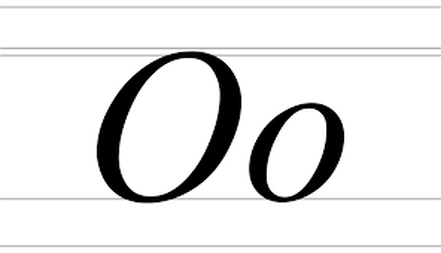 Omicron
OmicronOmicron is the 15th letter of the Greek alphabet. The word omicron came to English around 1400.
In the Greek alphabet, omicron means small (or lower case) ‘o’, from Greek ‘o’ + mikros (small). Omicron is a short or soft ‘o’; i.e., omicron is usually pronounced ‘aa muh kraan’.
Mikros, as you might expect, is also the origin of the English prefix micro-.
Omega
Omega is the last letter of the Greek alphabet. The word omega came to English around 1400.
In the Greek alphabet, large (or upper case) ‘O’ is omega, from Greek ‘o’ + megas (great, large, vast, big, high, tall; mighty, important), from the Proto-Indo-European (PIE) root meg (great). In ancient Greek, omega was a long or hard ‘o’ in contrast to the soft ‘o’ of omicron. Omega usually now means the extreme or final part of something.
Again, we can see that megas is the origin of the English prefix mega-.
In brief
Today, this distinction between long and short ‘o’ is no longer made—modern omicron names both. However, in British English omega is still usually pronounced ‘OH meh guh’, perhaps a remnant of the old long ‘o’. In contrast, in American English omega is usually pronounced ‘oh MEH guh’. Take your pick.
Perhaps we’ll know that we’re at the end of the current pandemic when the Omega variant shows up?!
Reference: Online Etymological Dictionary, https://www.etymonline.com/
Published on December 18, 2021 13:00



